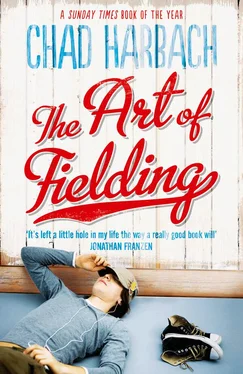Affenlight enjoyed having the run of the library after hours, and frequently he neither studied nor shelved but simply poked around. Late one evening in the fall of his junior year, he found a thin sheaf of yellowed paper, tucked between two brittle magazines in the library’s non-circulating bowels. The faded handwriting on the first page announced that it was a lecture given by one “H. Melville” on “this first instant of April 1880.” Affenlight, sensing something, turned the page. A visceral charge went through him when he read the opening sentence:
It was not before my twenty-fifth year, by which time I had returned to my native New York from a four years’ voyage aboard whalers and frigates, having seen much of the world, at least the watery parts, and certain verdant corners deemed uncivil by our Chattywags and Mumbledywumps, that I took up my pen in earnest, and began to live; since then, scarcely a week has gone by when I do not feel myself unfolding within myself.
Upon his first reading, Affenlight failed to untangle the syntax before the semicolon, but that final clause embedded itself swiftly in his soul. He too wanted to unfold within himself, and to feel himself so doing; it thrilled him, this oracular promise of a wiser, wilder life. He’d never traveled beyond the Upper Midwest, nor written anything a teacher hadn’t required, but this single magical sentence made him want to roam the world and write books about what he found. He snuck the pages into his knapsack and back to his room in Phumber Hall.
The stated topic of the lecture was Shakespeare, but H. Melville, excusing himself by the sly pronouncement that “Shakespeare is Life,” used the bard as reason to speak of whatever he wished — Tahiti, Reconstruction, his trip up the Hudson, Webster, Hawthorne, Michigan, Solomon, marriage, divorce, melancholia, awe, factory conditions, the foliage of Pittsfield, friendship, poverty, chowder, war, death — all with a scattered, freewheeling ferocity that would have done little to refute his in-laws’ allegations of mental imbalance. The more deeply Affenlight imbibed the lecture, hidden away in his dorm room from any influence that might shake him out of his strange mood, the more convinced he became that it had been delivered extemporaneously, without so much as a note. It astonished and humbled him to think that a mind could grow so rich that its every gesture would come to seem profound.
The next day Affenlight left his room and went in search of an appropriate authority. Professor Cary Oxtin, the college’s expert in nineteenth-century America, perused the pages slowly in Affenlight’s presence, tapping his pen against his chin. Upon finishing, Oxtin declared that though the prose was unmistakably Melville’s, the handwriting was not. The lecture must have been transcribed — and who knew how reliably — by some attentive listener. He added that by 1880 Melville counted as little more than a travel writer past his prime, and so it was not implausible that his lecture had been misplaced and that his visit to Westish had passed unnoticed by history.
Affenlight left the pages with Professor Oxtin, who shipped copies of them eastward, to the counters and compilers of such things. Thus they entered the scholarly record. Several months later, Oxtin published a long essay on Melville’s Midwestern trip in the Atlantic Monthly — an essay in which Affenlight’s name did not appear.
At the end of that dismal ’69 season — the Sugar Maples won just one game — Affenlight turned in his helmet. Football had been a diversion; he had a purpose now, and the purpose was to read. It was too late to change majors, but each night when his problem sets were finished, he devoted himself to the works of H. Melville. He began at the beginning, with Typee, and read through to Billy Budd. Then the biographies, the correspondence, the critical texts. When he’d absorbed every word of Melvilleania in the Westish library, he started over with Hawthorne, to whom Moby-Dick had been dedicated. Somewhere in there he’d stopped shaving as well — these were the opening days of the ’70s, and many of his male classmates wore beards, but Affenlight imagined his as something different: not a hippie beard but an antique, writerly one, of the kind that graced the faded daguerreotypes in the books he was learning to love.
He had also, from his first days on campus, fallen in love with Lake Michigan — having grown up in landlocked farmland, he was amazed by its vastness and the combination of its steadiness and its constant fluctuations. Walking along its shore called forth some of the same deep feelings that his reading of Melville did, and that reading explained and deepened his love of the water, which in turn deepened his love of the books. He resolved to get himself to sea. After graduation, he managed to display enough knowledge of marine biology to win an almost unpaid job — an internship, in today’s parlance — aboard a U.S. government ship bound for the South Pacific. For the next four years he saw much of the world, at least the watery parts, and learned how well Melville had captured the monotony-in-motion of life under sail. He woke in the night, every three hours, to record data from a dozen instruments. With the same regularity he recorded his lonely thoughts in graph-paper notebooks, trying as best he could to make them sound profound.
After those four years he returned to the Midwest. He’d turned twenty-five, the Age of Unfolding, and it was time to write a novel, the way his hero had. He moved to a cheap apartment in Chicago and set to work, but even as the pages accumulated, despair set in. It was easy enough to write a sentence, but if you were going to create a work of art, the way Melville had, each sentence needed to fit perfectly with the one that preceded it, and the unwritten one that would follow. And each of those sentences needed to square with the ones on either side, so that three became five and five became seven, seven became nine, and whichever sentence he was writing became the slender fulcrum on which the whole precarious edifice depended. That sentence could contain anything, anything, and so it promised the kind of absolute freedom that, to Affenlight’s mind, belonged to the artist and the artist alone. And yet that sentence was also beholden to the book’s very first one, and its last unwritten one, and every sentence in between. Every phrase, every word, exhausted him. He thought maybe the problem was the noise of the city, and his dull day job, and his drinking; he gave up his room and rented an outbuilding on an Iowa farm run by hippies. There, alone with his anxious thoughts, he felt much worse.
He returned to Chicago, got a job tending bar, resumed his reading. With each new writer he began at the beginning and proceeded to the end, just as he’d done with Melville. When he’d exhausted the American nineteenth century, he expanded his reach. By absorbing so many books he was trying to purge his own failure as a writer. It wasn’t working, but he feared what would happen if he stopped.
On his thirtieth birthday he borrowed a car and drove up to Westish. Professor Oxtin, thank God, was still alive and compos mentis. Affenlight, with a calm determination that stemmed from desperation, reminded the old man of the capstone that the Melville lecture had placed on his career, and of Oxtin’s failure to credit him in the Atlantic article. The old man smiled blandly, not quite willing to admit or refute the charge, and asked what Affenlight wanted.
Affenlight told him. The old professor lifted an eyebrow and walked him down to the campus watering hole. There, over beers, he administered an impromptu oral examination that ranged from Chaucer through Nabokov but dealt mainly with Melville and his contemporaries. Satisfied, perhaps even impressed, the old man placed the call.
Читать дальше










